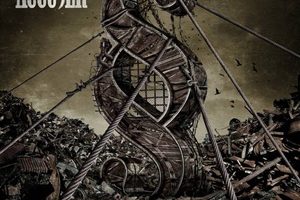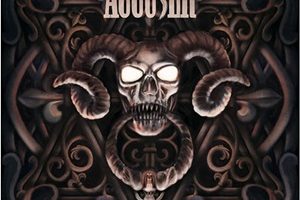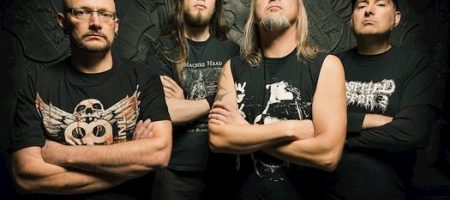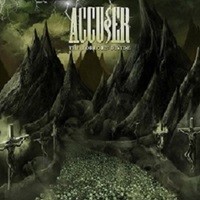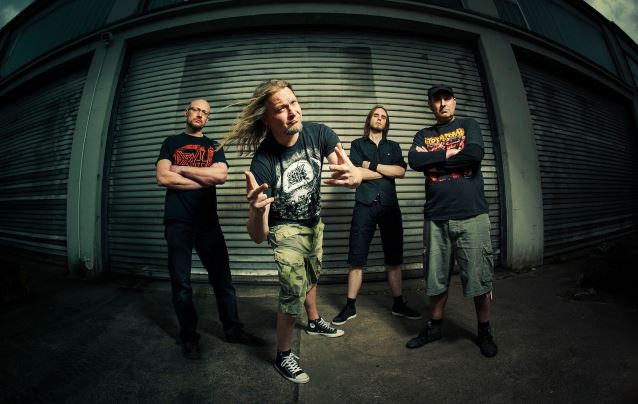Accuser – Smooth Contamination
Monday, 30th November 2020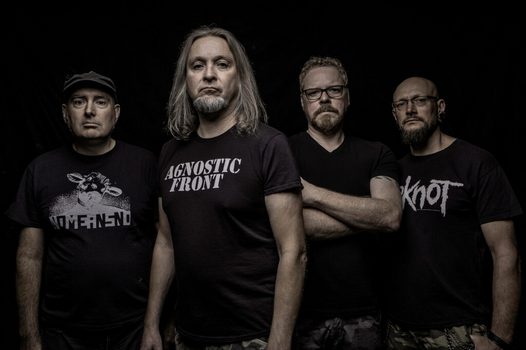
For their twelfth studio album, German thrash act Accuser decided to go the self-titled route. Which makes sense – long-time guitarist René Schütz returns to the lineup after a decade-long absence, and the quartet feel content and confident to incorporate a mix of material that pulls from their early years for influences while still being quite heavy and appropriate in 2020. Atypical in the sense that the quartet draw inspiration from many first/second wave of Bay Area thrash bands then their domestic brethren, the sound has finesse amidst the heaviness and a musically sharp precision befitting a veteran outfit.
After a band rehearsal we got the chance to hook up on Skype with guitarist/vocalist Frank Thoms and guitarist René Schütz, who brought us up to date on the development of the new album – highlights and lowlights of the discography and touring, thoughts on their German metal scene, plus worries over long-term social distancing due to this pandemic.
Dead Rhetoric: The eleventh studio album for Accuser is ironically self-titled. Outside of the return of René Schütz on lead guitar, where do you gentlemen see the differences or goals of this record compared to your previous discography?
René Schütz: I think the whole songwriting process…Frank did most of the writing stuff, and it was written over several sessions over the year. All the influences in this record have been there since the first records that we did in the 1980’s. It’s self-titled because it reflects the whole history of Accuser, including the new modern parts of today.
Frank Thoms: There are some parts like the first album The Conviction, it’s a type of mix from 1986 until today. We have René back so it’s also a good reason to call this Accuser.
Dead Rhetoric: How did it feel to come back to the band René, as you had been away for a few years? Had you been paying attention to what they have been doing?
Schütz: Yes, I’ve been away for exactly ten years. It was a good break, but Accuser has always been a big part of my life, musically. In the first era I was there until Taken by the Throat, and then when we had the reunion back in 2003. It feels very, very good, even at the time I was not in the band we still had contact and the feelings were I would come back in the band someday. Everything happened like it did, Dennis left the band and the first person they asked to join that position as lead guitar player was me. And there was no decision for me, I wanted to be back in the band again. It feels very, very good.
Dead Rhetoric: You mention in the bio that Accuser has developed their own blend of thrash metal. What do you consider the key elements that make up the band’s style and outlook on the genre – and do you find things easier to flow with the creativity because of your years of experience at this point?
Schütz: The specialness that Accuser has is an old style of thrash metal. The development was definitely a process. The first thing that we tried in the 80’s was not to sound like a German thrash band, like Sodom or Kreator. Our influences have always been based at the Bay Area thrash scene, these influences you can hear on the first record. Everything that followed was a process. We developed personally, we developed musically, and everything that followed was just a natural process. That is why Accuser sounds like Accuser and not a Slayer copy or a Testament copy, or whatever copy. There are always influences you will hear, it’s a genre that is very hard to do your own stuff. What we did and what we mentioned is we didn’t want to sound like a copy from another band.
Thoms: It takes a little time. It’s not a typical American or German style, we made our own sound and it takes some years. When you listen to Accuser, you will hear Accuser.
Dead Rhetoric: What sorts of lyrical topics did you tackle on this album? Do you find it easier or harder to tackle lyrics these days without running into the same subject matter that may have been covered previously – or is there plenty of fuel in today’s social/political climate to cover?
Schütz: Lyric-wise Frank did all the lyrics. I think these days it’s as easy as it was in the early days. Frank is doing in his vocals and lyrics, environmental things, political things, and for me today it’s even easier to get things for your lyrics. These times are very fast and very bad, there’s good stuff to write lyrics about. The whole world is getting more complex and destructive, and that’s a very good basis to get stuff from.
Thoms: Things repeat. The first lyrics came in 1986 and now it’s 2020. Some things don’t change, and other things repeat themselves and start again. The big content of this album is the parallel between the two eras, and some things never change. We have some lyrics on this record that are over a decade old and they still apply today.
Dead Rhetoric: How did the idea behind the cover art come about- as I know it usually starts from something within the band before passing it off to an artist to reach the final product?
Schütz: The album artwork was as simple as the title suggests. We planned to call the album Accuser and the idea was to just put the symbol on the cover. We didn’t know in which way, but we knew it needed to be in the center of the cover. We didn’t know in exactly which way it would be. We talked to a few artists, they made some drawings. And that’s why we just had the symbol of the cover.
Thoms: It’s a symbol for justice, and is it possible that this will stand or fall? I think it’s a good metaphor for the cover. Once we had the idea to be a giant symbol on the cover, we had a lot of people surrounding it who were trying to destroy it. But it’s much more simple and eye-catching.
Dead Rhetoric: Tell us about the video shoot for “Phantom Graves” – as you choose to keep it performance style in a darker, black and white setting. Were you limited in what you could do because of the pandemic?
Schütz: Yes. We originally had plans to do this video in a club, and the plan was to film a live performance. Because of the pandemic situation we had to cancel all of these plans and do it as just in the practice room. When we shot the video, that was more or less the only possibility to give it that live kind of feeling. We made the decision in the practice room, had a few cameras, a soundman and we had two versions – a color version but the black and white version was much more intense. Like an old silent movie because there was a lot of contrast. It’s much more intense so we decided to release that version.
Thoms: It was important to try to convey in the rehearsal room some of the action that you may experience out on stage. We sing and we play, it looks a little bit different.
Dead Rhetoric: Now being with Metal Blade for three albums, how do you feel about their support, especially given the longevity of the label and their wide-ranging staff plus knowledge of the genre?
Schütz: That’s a hard question for me to answer as I’ve only been back in the band for one year. The guys have been with Metal Blade much longer. I have really no experience what the deal is, but so far it seems very good. All the interviews, the video shoots.
Thoms: This is our third album with Metal Blade. The community is very great. That’s the best way for us, to work with Metal Blade. They are great guys, it’s a perfect fit.
Dead Rhetoric: What do you consider some of the career highlights of Accuser – specific albums, songs, shows, tours, or other moments where you knew you were making an impact and possibly moving up the ranks in the scene?
Schütz: The funniest thing or the worst thing I remember was the tour with Overkill. It was pretty weird, we’ve been fans of the band, and they have a bassist that was very hard to deal with. We never had a soundcheck on the tour because they wanted to play football in the hall of the venue. Some things like this happened during the whole tour. We were supposed to tour for four weeks and we cancelled the tour after ten dates. You are looking forward to touring, and it opens your eyes a little bit. Touring can be pretty, pretty tough.
Thoms: As you start, in 1986, I had a band Expect No Mercy. I was very young. I left the band and I go to Breaker in our hometown. Then I started Accuser. We made The Conviction, and René comes. Our paths crossed again, as we have known each other for over 35 years. During the 1990’s we tried to put in new elements in our music, an experimental era of our music. A little bit more progressive thrash, with a lot of parts and feelings in it. Repent was another start with the band, we tried to search for a new singer. Max Cavalera was my buddy, I like Sepultura so I started to sing and it worked. We went through a bit of a hardcore with Reflections and Taken by the Throat, and that was interesting for me. The band didn’t have similar records, and it was a creative time for the band but a little bit dangerous for the diehard fans. It’s very easy to create music, just writing one album and the same album to keep your fans. That was not the goal we had- we wanted to try new things and different things. We never made the same album twice.
Dead Rhetoric: Where do you see the state of heavy metal in general within Germany – as it’s definitely considered one of the epicenters in Europe due to its diversity, population, and well-regarded and well-attended festivals that have been established for decades?
Schütz: I think the metal scene in Germany is definitely one of the biggest. We have a few of the world’s largest festivals, and the community is very loyal. The problem I see right now with the pandemic, there are no concerts and no clubs open, and we have a lot of people who had to close their clubs. It’s extremely expensive, and if you have no visitors, you can only do things on tv and watch on the computer. If you cancel live shows over the years, the people can’t get together and that’s a big part of heavy metal. The community, the strength of talking and having fun together. All these things, not just playing in a band, but the social aspect is missing right now and could be for a long time. The social distancing could destroy the whole culture of the music scene.
Dead Rhetoric: How do you balance out the activities of the band with your regular jobs and family lives/responsibilities?
Thoms: I have an office, I do things with houses and other guys. I’m writing bills and I have a music store.
Schütz: I have to be in a music store from 10 am to 6 pm. It’s what I do for a living, but I have enough free time to do small tours. We all have jobs, we all have families with children. It’s never been a problem for our jobs and our families that we play music, rehearse, write songs and play concerts. It’s a part of our lives.
Dead Rhetoric: What concerns you most about the future of the world that we will live in once we pull through this pandemic?
Schütz: The future of this world… it’s scary. What I’ve already said, social distancing, I’m really afraid of this. If it doesn’t change in the future, that we just do all things at home, schooling, work, etc. in your own four walls with no contact to your community, via computers and monitors and phone, if it doesn’t change in the next years we will grow insane. I’m a little afraid of that, we need contact in person, and that’s strange for me.
Thoms: We have to be carefully together. We hope things can be normal slowly. I think it was tougher in the summer because people are usually going on holidays. Now the pandemic has come back before it gets better. We have to be careful again.
Dead Rhetoric: What is your best concert memory from a fan perspective?
Schütz: The best concert memory ever for me was when I saw Testament and Megadeth in Essen. I’ve always been a big Dave Mustaine fan, it was great to see that live. As well as Testament on the same bill, Megadeth had the So Far, So Good, So What? album, and Testament was touring on The New Order. That was my best concert live experience, it was new, and fresh, and seeing all these Bay Area guys on stage for me was great.
Thoms: In 2013 we had these festivals, and with some interesting bands for us. We had the ability to see Carcass, Exodus, Arch Enemy, a lot of bands. It was a great experience to see them and be with them backstage. To see that we are all normal people.
Dead Rhetoric: How do you see the next twelve to eighteen months shaping up for Accuser as far as promotional activities? In this downtime, has work already begun on the next effort to get a head start when live show/touring activities are back into play?
Schütz: As soon as it’s possible again, we already have ideas to play shows. During the lockdown we had shows planned in Hamburg and Essen, but we don’t know if they will happen with Legion of the Damned. If everything goes normal, we are planning live shows and festivals. You can’t plan, you don’t know what’s going to happen next. It can go from being able to go in restaurants to then another lockdown, it can change minute to minute, not just day to day.











